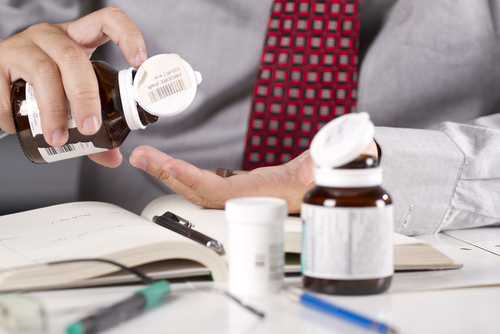If you’re like most employers, you’re concerned about the illicit use of alcohol and drugs on the job and how it affects safety. You may even drug-test your employees. But it’s not just the illegal use of drugs that can affect safety in your workplace—prescription drugs, over-the-counter (OTC) medications, and even herbal remedies can compromise employee performance and safety.

|
Workers who are using any kind of chemical or pharmaceutical to treat a medical condition should take the following precautions:
1. Read labels: Prescription and OTC medications come with information on how they can potentially affect patients–and all too often, patients don’t read it. Particularly if employees operate vehicles and machinery or perform other safety-sensitive activities, they should read the cautionary statements with any medication they’re taking and check for warnings against:
- Operating machinery, and
- Potential drowsiness or dizziness.
If medications could affect their ability to safely perform work, employees should discuss options with their supervisors.
Learn to speed up improvements in safety performance among employees at your facility. Join us on Friday, February 27 for an online webinar, Accelerators of Safety Excellence.
2. Do the trial run outside of the workplace: Employees should not make the workplace the first place they take a medication. Medications affect everyone differently, and the cautionary statements are just guidelines. An employee won’t know how a medication will affect him or her until actually taking it, and you don’t want your workers to discover on the job that a medication impairs their ability to operate machinery or affects their balance or capacity to think clearly.
3. Beware of interactions: The cautionary statements provided for medication generally refer to taking the medication in isolation. Other medications (prescription, OTC, and herbal remedies) can affect how the medication performs, including amplifying its effects. Employees should speak with their healthcare practitioners or pharmacists if they take more than one medication, or take herbal supplements in addition to medication, to determine the potential effect of multiple medications.
4. Think about the work conditions: How an employee reacts to a medication can be affected by the work environment. If a work environment is hot and the employee is sweating a great deal, the effects of a medication can be amplified. Also, side effects can be felt more keenly in a fast-paced environment or a slower environment that is high stress. Bear this in mind when evaluating whether a medication can be safely used while working.
Attend this webinar to learn the 8 safety excellence accelerators to improve safety performance. During the webinar you’ll learn how to generate support from upper management to pursue safety excellence. Register Now!
5. Remember OTC drugs: You might think that only medications that require a prescription are potentially unsafe at work. Think again. OTC medications, especially if not used according to instructions, and herbal remedies can also cause side effects (for example, dizziness, drowsiness, and impaired cognition) that affect an employee’s ability to work safely. Employees should evaluate all medications they take—prescription, OTC, and herbal—to determine if they can work safely while taking them. If a question arises, they should consult their healthcare practitioners or pharmacists, and they should be encouraged to discuss any need for adjustments to their work assignments with their supervisors.
Tomorrow, we’ll look at a drug that is legal in more and more states for both medical and recreational use: marijuana.

I do not think you can over emphasize the importance of not only reading, but understanding the label. I had a co-worker who overdosed on decongestant; he combined a multi-symptom cold medicine with a cough medicine (both OTC). He was lucky he did not experience a more severe reaction than a very extreme case of ‘jitters.’